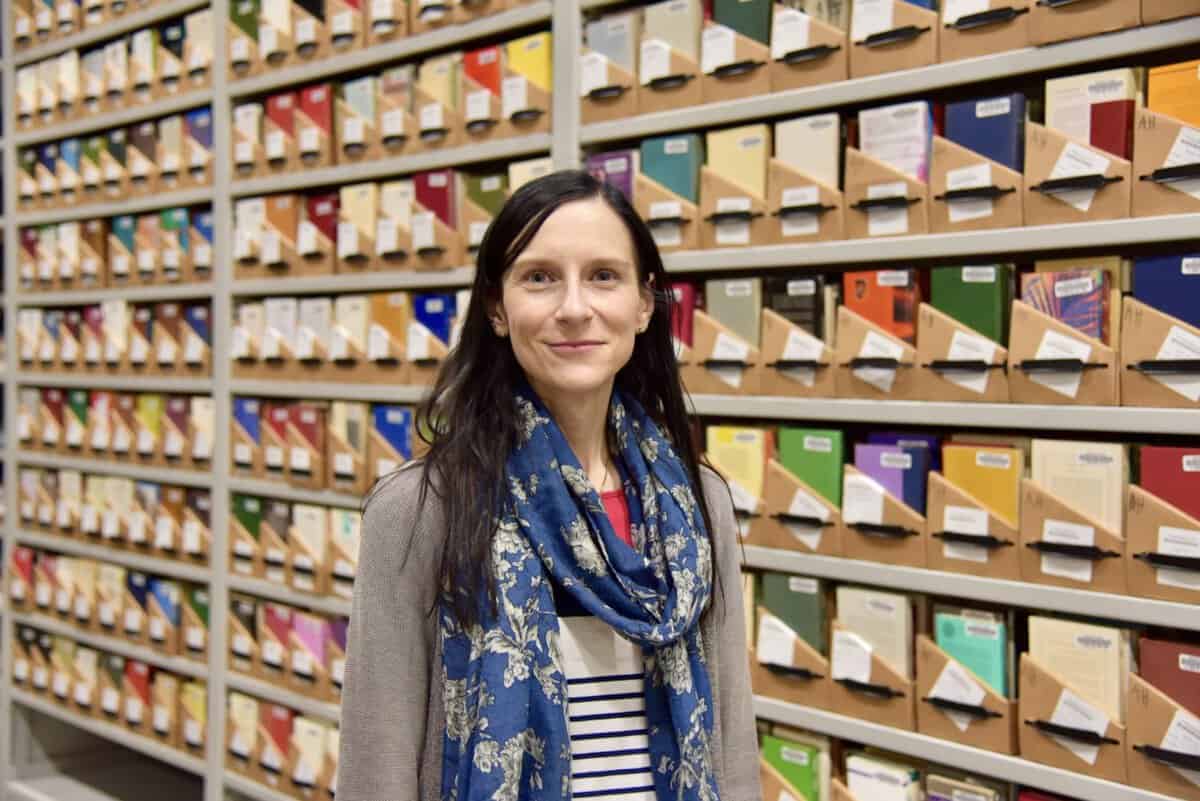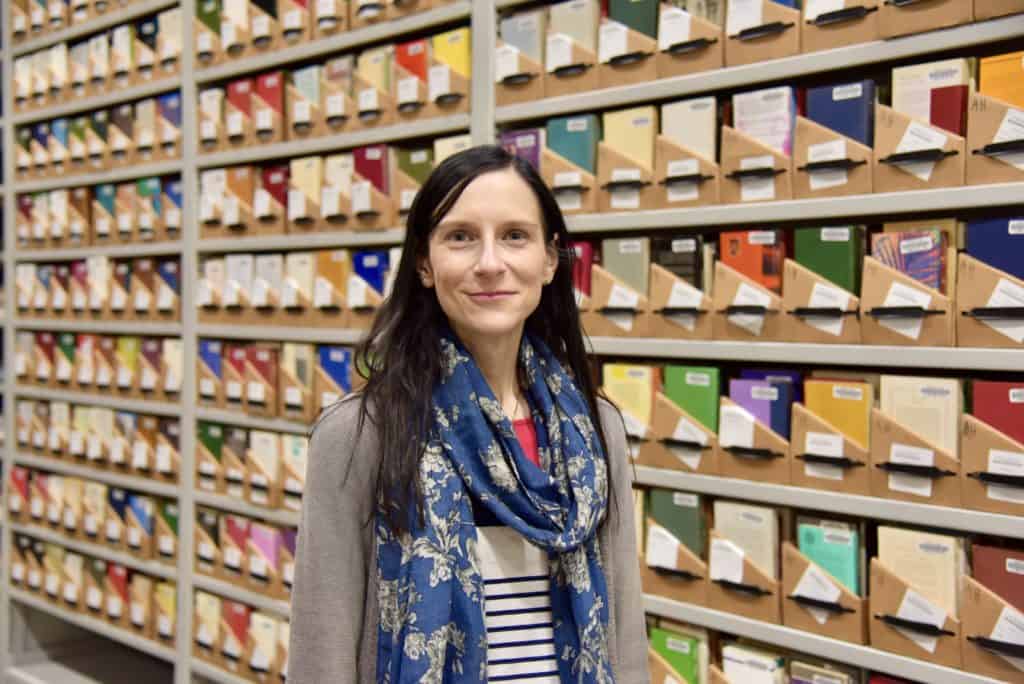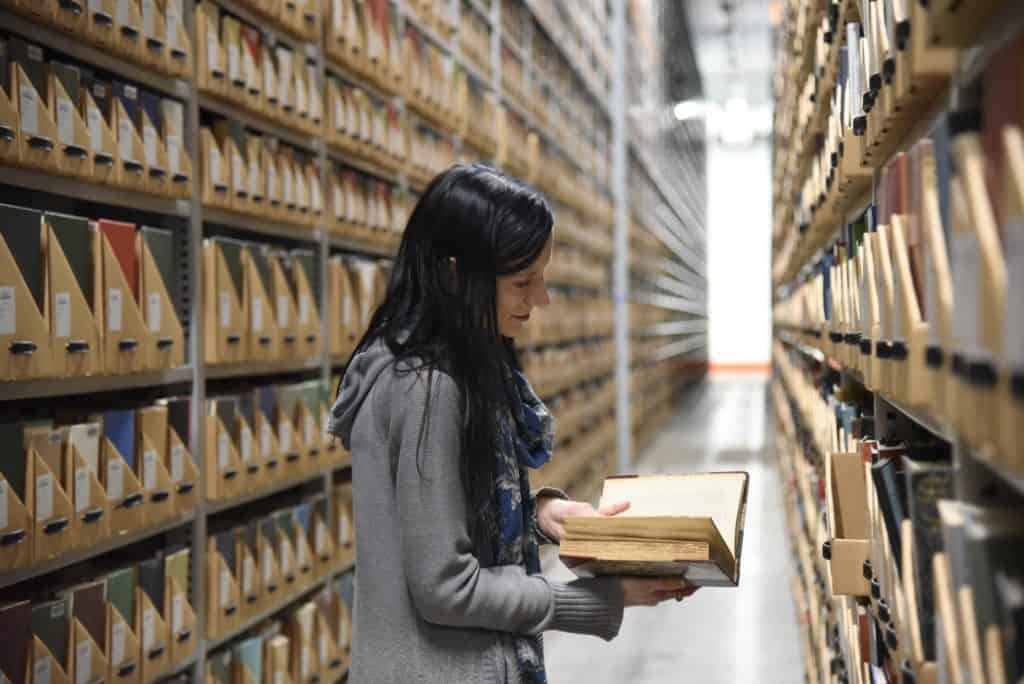Inside the University of Iowa Libraries is your look behind-the-scenes to meet the people and discover the stories making our organization unique and valuable. From cutting-edge databases to rare books, join us to explore a world of research, preservation, and discovery that fosters student success through countless touchpoints.
Being forklift certified is not typically a part of a librarian’s job requirements, but Maggie Halterman-Dess operates one daily to reach shelves up to 22 feet high at the University of Iowa Libraries Annex. The unique skill allows Maggie and her team to be the connection to more than 2.1 million items in storage at the Annex, which the university community and beyond can request for delivery to the seven library locations and other offices on campus.
Maggie has served as the Annex coordinator since 2017, managing the only offsite high-density library storage facility in the state of Iowa. It’s a temperature-controlled environment that can hold up to 4.8 million items.
In her role, she provides circulation and interlibrary loan services to patrons, supervises the Annex staff, coordinates collection storage in the stacks warehouse, and processes materials moved from campus libraries. She also collaborates with Special Collections and Archives and Conservation and Collections Care staff to ensure safe storage and housing environments for a variety of physical content formats, including 16mm film, archival collections, microfilm, microfiche, books, and software.
A proud UI School of Library and Information Science (SLIS) alumna, Maggie is active in the Iowa Library Association and the Iowa Association of College and Research Libraries chapter. In September 2024, Maggie also started a temporary assignment serving as the supervisor for the Main Library’s Interlibrary Loan and Document Services, splitting her work time between the two locations.
Speaking of the Main Library, Maggie had a big and very special life event take place on the fourth floor. We propose that you read Maggie’s Q&A below to find the full story.
Q: How does your work support student success?
A: My role is largely “backstage” or “behind the scenes,” but it directly impacts how our students and campus community experience the Libraries. If we are doing our work right, resources just seem to magically appear on the hold shelf or are delivered via e-mail. Sometimes this involves more than a little bit of detective work on our end! That could be either trying to correct a citation, or merely figuring out why the catalog won’t allow a request to be put through.
Since my position and job duties are fairly unusual, I am always happy to speak with SLIS classes or have them visit us for a tour. It can be very difficult to get your head around the way materials are shelved at the Annex, or the sheer scale of both the collections and the facility! I never imagined doing this when I was in graduate school. So, I really value exposing students to a different way to “library.” I might not inspire a burning love of collections storage, but I hope to get them imagining more expansively what working in the library field might include.
Q: What might someone find surprising about your work?
A: I know it’s a clichéd joke that nobody goes to library school and learns to troubleshoot printers, but I have learned a ton about environmental engineering and HVAC systems in my work, as well as getting forklift certified.
Q: How did you find your way to the Libraries?
A: I was taking a health-related leave of absence from finishing my undergraduate degree here at Iowa and met someone working as a media specialist (though not a teacher librarian) in a middle school and thought, “Hey, I could do that!’”
Cue copious research and applying to library school. During my time in SLIS, I taught information literacy and worked in the Iowa Women’s Archives. Then, I bounced in and out of the Libraries due to life circumstances for a bit before landing out at the Annex.
Q: What advice would you have for those just embarking on their own careers?
A: My dad told me when I was in undergrad not to get too stuck on one path. He had five different majors and, at the time of this conversation, he really enjoyed what he had ended up working on. However, when he had first joined his company, that kind of role didn’t exist. Technology had changed just that much in just the dozen or so years in between. So, given that advice and my own unusual experience, I would advise keeping an open mind, staying curious, and being aware that the world is going to change a lot over the course of your working life.
Q: What might colleagues or students find surprising about you?
A: I often speak about my strong family connections to the university. My parents are alumni who met back when Currier Hall had a cafeteria for their mutual friends to hang out in, and my two siblings and I hold five degrees from Iowa between us. But something I don’t think I mention often publicly is that my spouse proposed to me on the fourth floor of the Main Library in the “PL” section.
To request materials from the Annex, search for them on InfoHawk+.



